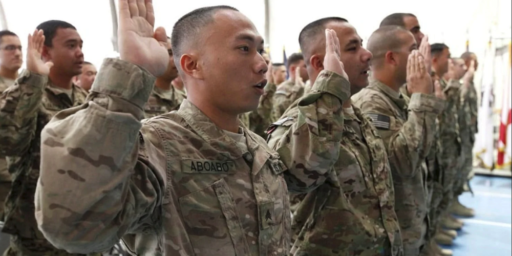Terrorists as Criminals Rather than Soldiers
Retired General Wesley Clark and UCLA law professor Kal Raustiala have an op-ed in today’s NYT arguing that the Bush administration policy of treating terrorists as “unlawful combatants” rather than criminals is problematic.
Treating terrorists as combatants is a mistake for two reasons. First, it dignifies criminality by according terrorist killers the status of soldiers. Under the law of war, military service members receive several privileges. They are permitted to kill the enemy and are immune from prosecution for doing so. They must, however, carefully distinguish between combatant and civilian and ensure that harm to civilians is limited.
[…]
The second major problem with the approach of the Bush administration is that it endangers our political traditions and our commitment to liberty, and further damages America’s legitimacy in the eyes of others.
They’re right, so far as it goes, on both counts. I’ve argued from the beginning of the GWOT that terrorists are not entitled to the honored privileges of soldiers and that legal residents of the United States have Constitutional rights that are not trumped by allegations of terrorism.
Clarke and Raustiala go too far, though, in their conclusion:
We need to recognize that terrorists, while dangerous, are more like modern-day pirates than warriors. They ought to be pursued, tried and convicted in the courts. At the extreme, yes, military force may be required. But the terrorists themselves are not “combatants.” They are merely criminals, albeit criminals of an especially heinous type, and that label suggests the appropriate venue for dealing with the threats they pose.
Accused terrorists caught on American soil are indeed mere criminals. But most terrorists and plotters are not subject to American law. Nor are most even living in societies apt to comply with extradition requests. So, while the investigative techniques of law enforcement might be useful, arrest and trial are not feasible goals. In those cases — which because of their sheer numbers are far from “extreme” — the military option is likely the only one available.






“First, it dignifies criminality by according terrorist killers the status of soldiers”
How is that so??. I would think that if they were given POW status then that would be true but a combatant does not, to me, imply they are given the status of soldier.
I’ve made the analogy between terrorism and piracy myself. It bears remembering that large-scale piracy continued until (basically) Britain and the United States began going after it vigorously and the nations that were sponsoring it (which included Britain and the United States) stopped doing so.
Terrorists are indeed criminals. Where they lurk in a functioning state, we should collaborate with that state to eradicate them — or go to war with that state (see “Afghanistan”) if it refuses to cooperate.
Where they lurk in a failed state, or portion thereof (like Pakistan’s NW Province), then either the state exercises force against them, or we do it for them.
Those are the circumstances in which I think military force is appropriate against terrorists. It doesn’t have anything to do with their being other than mere criminals; it has to do with the presence or absence of a state apparatus devoted to apprehending such criminals.
I’m not sure you disagree. After all, the U.S. has taken military actions against pirates. That’s the “extreme” option, when nothing else can work.
Strange…What status does a nation-state have if they provide training camps, weapons and leadership to terrorists?
So is it a crime to detonate a nuke in New York City? If it is a crime, is it then a crime to detonate another one in San Fran, and one in Boston and one in Washington DC? Where is the boundary between criminal act and acts of war.
I would suggest that the terrorist already knows he/she/it is at war and the American Liberal just can’t grasp the concept.
There is a more practical approach to all of this, that seems to be getting ignored by all sides; That being, the criminal justice system already has a number of flaws in it, which are rather continual basis allows criminals to roam free. I made reference earlier today to the child rape suspect in Maryland, who was rearrested in Philly just this morning, after the judge set him free on the grounds that nobody spoke his language.
Can we afford to have terrorists handled in the same manner?
“Can we afford to have terrorists handled in the same manner?”
No, and that’s why they were given “enemy combatant” status I thought. That way we can keep em’ as long as need be wherever we want without the hassles and misgivings of the courts…and lawyers…
The boundary is who does it. If the people who set off a bomb in NYC (or flew a plane into a building) were employed by a foreign government, then it’s an act of war. If the people were employed by Ernst Blofeld (or Osama bin Laden), then it’s terrorism (or a crime, depending on your view of this debate).
The difference is important… you can declare war against a country – threaten it, embargo it, invade it, etc…, but you can’t really do the same to a non-state like AQ or SMERSH… if we find an AQ training camp in some random country, we can’t just blow it up without some sort of coordination – maybe the host country knows it’s there, maybe they don’t. If we just waltz in & nuke the place, we’ve as much as declared war on that host country, and there’s a lot of paperwork before you can do that…
Of course, the idea that the ones that we’ve released on those grounds are showing up on the battlefield, killing American soldiers, means nothing to you.
Of course, the idea that the ones that we’ve released on those grounds are showing up on the battlefield, killing American soldiers, means nothing to you.
Yet another gratuitous personal attack by one of the commenters who’s allowed to make OTB such a nasty place to visit.
The comment struck me as odd, especially coming in response to someone who seemed to be agreeing with him. Otherwise, I just took it as a rather clumsy way of making a valid argumen — That playing by the rules when the other side isn’t is not without its cost — rather than a personal attack.
JJ, it’s your blog, but saying that another commenter doesn’t care whether American soldiers die or not is a “personal attack” by any reasonable definition.
Anderson’s first comment nailed it. And that’s exactly what we did in Aghanistan, back when Bush had the support of >90% of the population, including me. Kill them when they don’t surrender. If/when they do, we’re big and strong enough to be able to handle them in our court system. You guys don’t get the precedent that Bush’s gang of thugs are setting for future administrations, including Hillary’s.
Well, how else am I to take the point?
Isn’t terrorists getting turned loose to fight again… (and this is being documented) a logical consequence that needs be considered, here? Am I to assume he simply doesn’t understand that consequence to be directly connected to what he’s urging us to do? Bad enough it happens in our supposed criminal justice system. But even when it’s working correctly, the criminal justice system was never intended to take up homeland defense…
How is relating a fact, a personal attack?
In any event, It’s possible I read sarcasm that wasn’t in mark’s comments. If so, my apologies to Mark.
Heh, no, there was no sarcasm. I thought that the prisoners were given enemy combatant status to more even the playing field…so they WOULDN’T have a lawyer and wouldn’t be set free. Worst case I thought they would be moved to our not so secret prison in Romania.
Oh, and I am all for ANYTHING we can do to keep our soldiers alive.
Agreed.
And again, it appears I fell victim to a major weak spot in discussion via text; a lack of inflection by which to determine intent.
(Tip of the ballcap)